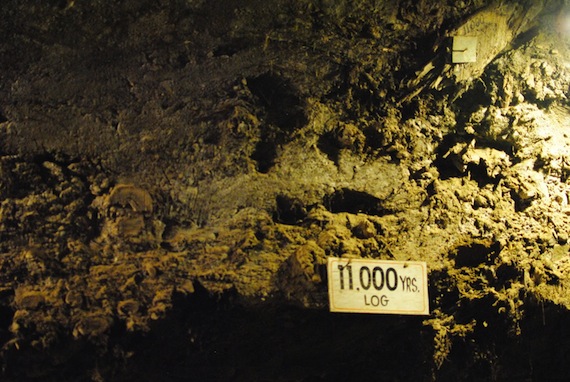
This is an 11,000-year-old log in an underground research tunnel near Fairbanks, Alaska. (Photo by Michael Loranty)
Professor Michael Loranty and Kira Yasuda ’15 are currently in Healy, Alaska, examining the effects of permafrost thaw on ecosystem water and nutrient cycling.
The study is in conjunction with St. Olaf College, Woods Hole Research Center, and the University of Florida. The Healy sites, run by the University of Florida and the Woods Hole Research Center, include places where permafrost thaw is occurring naturally as well as an experimental manipulation to artificially thaw the permafrost.
A portion of the research occurs in an underground permafrost tunnel near Fairbanks, AK. The tunnel was constructed and is administered by the U.S. Army Corps of Engineers Cold Regions Research and Engineering Laboratory. The image above, taken in the tunnel by Loranty, is an 11,000 year old log frozen in the ground. According to Loranty, the implications of this are important: “If this log thaws, it will decompose and contribute to further climate warming.”
Loranty’s recent work on how the thawing of vegetation like this log could impact climate change was featured earlier this year in a Scientific American article titled: “Vegetation May Speed Warming of Arctic.”
While in Alaska, the research team will also collect samples of methane gas, which will be analyzed later at St. Olaf.

Kira Yasuda ’15 collects methane gas in Healy, Alaska. (Photo by Michael Loranty)
Colgate students will have many opportunities to work directly with professors on important research over the summer. Enter your e-mail address on the right where it says “subscribe” to get continuing news on summer research – and all other Colgate news – sent to your inbox.
Your turn: did you spend a summer researching at Colgate? Tell us about it in comments.